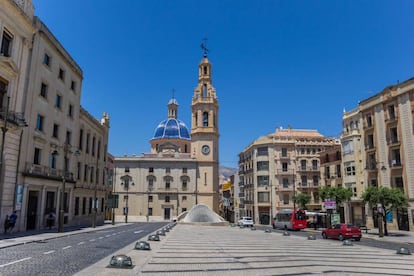Alicante: The province where foreigners are disappearing from municipal rolls
Uncertainty around Brexit is prompting British residents to abandon tourist coastal cities while unemployment is also forcing workers to leave inland towns


Of all the foreigners who live in Spain, the British community is one of the most closed off. Britons tend to recreate on Spain’s Mediterranean coast the life they had in the United Kingdom before they retired – complete with the same traditions, language, restaurants and pubs, and little relationship with the Spanish community. Just like England, only with sunshine. That’s why the slight drop of Britons has hit tourist municipalities on the coast of Alicante so hard. “A lot of the British people who lived here have gone,” says Kevin Reardon, the president of the British Legion in Orihuela Costa, a coastal are situated on the Costa Blanca in Alicante. “Lots of them. Fortunately, it seems like things are getting better and the number of people leaving has slowed down.”
According to figures from Spain’s National Statistics Institute (INE), the population of Orihuela and the surrounding metropolitan area has fallen 12.5% in the past five years – 6.5% in the last decade. The area most affected by the drop is Orihuela Costa, which is 40 kilometers from the city’s historic quarter and home mainly to chanes – as foreigners here are called. According to Orihuela City Hall, of the 101 nationalities who live in the area, most are British. And where there is a Briton, there is a branch of the British Legion, an organization that supports veterans from the British Armed Forces and their families.
The real problem is Brexit. Nobody knows what is going to happen
Kevin Reardon, president of the British Legion in Orihuela Costa
Reardon has maintained his name on the padrón, as the local municipal registry is known. But other British people continue to disappear off the list. While the financial crisis in Spain has played a role, Reardon says “the real problem is Brexit,” referencing the UK’s planned withdrawal from the European Union. According to Reardon, the impact of Brexit on Britons living in Spain has not been properly explained. “Nobody knows what is going to happen yet,” he says. This has pushed a large number of foreign residents to return to their countries of origin. Some “maintain homes as a holiday base,” Reardon explains, but others sold their properties just after the collapse of the construction boom for prices well below their value. “Most are regretting [the decision to sell], because they lost a lot of money in the deal,” he adds.
That’s why Reardon – who says he has lived in Spain “for many years” but prefers not to specify exactly how many – believes that British people will return to Orihuela Costa. Like other areas where there is large number of foreign residents, it is clean, well kept and adapted to meet foreigners’ needs. “Homes are being sold again, businesses are operating again. It looks like everything is getting better,” he says.
The population of Orihuela and the surrounding metropolitan area has fallen 12.5% in the past five years
The fact that both the Spanish central government and regional government of Valencia have taken measures to ensure all citizens – regardless of their immigration status – receive free healthcare is also a lure for foreign residents. “[Prime Minister Pedro] Sánchez and [regional premier Ricard] Puig have restored healthcare for us and that makes us very happy,” says Reardon.
In response to the falling numbers, Orihuela City Hall launched a campaign in June last year to encourage foreign residents to enroll on the padrón. According to the local authorities, the plan is working: “Since the beginning of the campaign 855 foreigners have enrolled,” they say.
During the launch of the campaign, Noelia Grao, the regional minister for statistics in Orihuela, explained that the initiative is aimed at “maintaining and building the population figures in Orihuela” to improve the quality of public services. The campaign focused on providing brochures in Spanish, French, German and English on how to enroll and making the process easier for foreigners.
Ageing city
Foreigners are not only leaving Alicante’s coastal cities, but they are also abandoning the province’s inland towns where the decline of industries such as agriculture and construction have pushed foreign workers to return home.
But the Alicante city of Alcoy is facing another serious problem: an ageing population. Located in a picturesque valley dotted with bridges, Alcoy was a major hub during the 20th century but today it is home to just 60,000 residents. The town is surrounded by mountains, which has made it difficult to grow, and its once-competitive industries, particularly the textile sector, have fallen into decline, forcing many young people to look for work elsewhere.

Eneas González, 32, left Alcoy to study and has never returned. Nor has his girlfriend, sister, cousins or parents. Today they all live in Alicante city. “You are studying, then you get scholarship after scholarship, in the end you find a job and you stay,” says González. Once his parents retired, they also moved to be closer to their grandchildren.
“Those who study outside of Alcoy have more opportunities to find a job and greater ambition to develop their career,” he explains. González says he is still proud to be from Alcoy and travels regularly to the town, which, he explains, takes just 40 minutes thanks to the new highway access.
Of his group of friends, half have remained in Alcoy and the other half have left. Javier Jaén, one of the friends who have stayed, says the main problem in Alcoy is the lack of job opportunities. “There’s barely any work,” he says. “There were factories making textiles and paper and the Coca-Cola bottling plant here, but everything has been lost.” The rise of globalized trade and Chinese-made products are two factors that have affected Alcoy’s competitive edge.
At the weekend, there is nobody in the historic center and the only shopping mall that exists “doesn’t work and has changed management five or six times” since it was opened, says Jaén. His wife drives 20 minutes every day to the town of Onil to work for a toy company. According to Jaén, tourism is the only sector Alcoy City Hall is trying to boost.
Alcoy was a major hub during the 20th century but today it is home to just 60,000 residents
Municipal authorities, however, say their job creation policies have led unemployment to drop “26% in the last four years.” “We have directly employed more than 400 people from different age groups and different qualifications,” they say. “We have improved all industrial areas of Alcoy and we have increased grants to create businesses and shops, especially in the center.”
But Jaén believes more needs to be done to stop Alcoy turning into a “dormitory town” for Alicante that will only be visited during the Moors and Christians fiestas in April. He explains: “The city has to generate a lot more opportunities for people to stay.”
Taking “zombie” names off the registry
In addition to real population loss, changes to municipal registry regulations have also caused a drop in numbers. Now City Halls must check every two or five years whether foreign residents listed on the registry continue to live in Spain. “In areas with a high population of foreigners, this regulation has a big impact on the registry,” says José Antonio Larrosa, director of the human geography department of the University of Alicante.
English version by Melissa Kitson.

